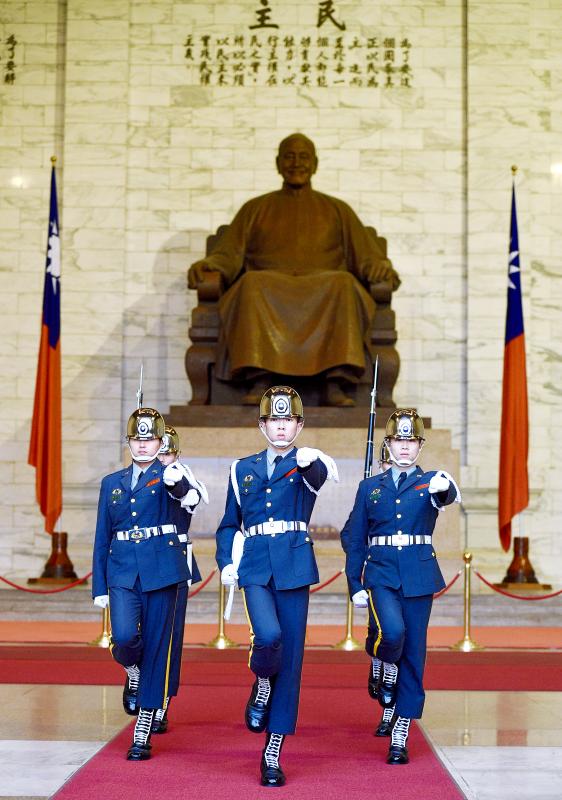The Taiwan 228 Incident Care Association on Monday last week again called for the removal of the Chiang Kai-shek (蔣介石) statue from the Chiang Kai-shek Memorial Hall in Taipei.
The call came after Taiwan Republic Office director Chilly Chen (陳峻涵) on Jan. 22 allegedly threw eggs at the statue.
Chen said his actions were in protest of comments made by Minister of Culture Lee Yung-te (李永得), who said he did not support the removal of the statue, as protesters seeking to get rid of the sculpture have been taking “a more moderate approach.”

Photo: Peter Lo, Taipei Times
“Chiang the mass murderer must take responsibility for committing atrocities in the Feb. 28, 1947, massacre,” the association said in a statement.
The Incident refers to a massacre by the then-Chinese Nationalist Party (KMT) regime, under Chiang’s leadership, of civilian demonstrators in Taipei. About 18,000 to 28,000 people were killed during the subsequent government crackdown, which lasted into early May 1947.
“Several hundred Chiang statues remain, and the largest one is at the Chiang Kai-shek Memorial Hall. It is up to our government leaders to have the resolve to remove them,” the statement said.
The statement said that Chiang in October 1945 instructed the military to confiscate rice, food and essentials from Taiwanese to ship to China for soldiers fighting in the Chinese Civil War.
“At the time, the KMT regime restricted all government positions for Mainlanders, and ruled Taiwan by segregation. Corruption, bribery, looting and abuse of power were abundant in that regime, which also seized Taiwanese property and assets,” it added.
These repressive policies caused resentment and discontent among Taiwanese, leading to the 228 Incident, it said.
Chiang had directly intervened in 3,195 political prosecutions, resulting in the execution of 876 people during the White Terror era, the association said, citing research about the period.
“Taiwanese are not as docile as Lee seemed to suggest. People are still asking questions about how Chiang with his KMT troops seized power by military force, forcibly seized Taiwanese’s land and money,” it said. “A mass murderer whose hands are tainted with many people’s blood, and yet this dictator’s statue is still on display at the memorial hall, where it is protected by military police.”
The association suggested that following the removal of the statue, the memorial hall could be converted into a museum affiliated with an academic research center for studying international politics and authoritarian regimes.
“The government must reveal Taiwan’s history and the truth of what took place, and must let people of all generations know that there is no legitimate reason for the statue of a mass murderer to occupy the largest memorial hall in the nation,” it said.

A preclearance service to facilitate entry for people traveling to select airports in Japan would be available from Thursday next week to Feb. 25 at Taiwan Taoyuan International Airport, Taoyuan International Airport Corp (TIAC) said on Tuesday. The service was first made available to Taiwanese travelers throughout the winter vacation of 2024 and during the Lunar New Year holiday. In addition to flights to the Japanese cities of Hakodate, Asahikawa, Akita, Sendai, Niigata, Okayama, Takamatsu, Kumamoto and Kagoshima, the service would be available to travelers to Kobe and Oita. The service can be accessed by passengers of 15 flight routes operated by

GIVE AND TAKE: Blood demand continues to rise each year, while fewer young donors are available due to the nation’s falling birthrate, a doctor said Blood donors can redeem points earned from donations to obtain limited edition Formosan black bear travel mugs, the Kaohsiung Blood Center said yesterday, as it announced a goal of stocking 20,000 units of blood prior to the Lunar New Year. The last month of the lunar year is National Blood Donation Month, when local centers seek to stockpile blood for use during the Lunar New Year holiday. The blood demand in southern Taiwan — including Tainan and Kaohsiung, as well as Chiayi, Pingtung, Penghu and Taitung counties — is about 2,000 units per day, the center said. The donation campaign aims to boost

ENHANCING EFFICIENCY: The apron can accommodate 16 airplanes overnight at Taoyuan airport while work on the third runway continues, the transport minister said A new temporary overnight parking apron at Taiwan Taoyuan International Airport is to start operating on Friday next week to boost operational efficiency while the third runway is being constructed, the Ministry of Transportation and Communications said yesterday. The apron — one of the crucial projects in the construction of the third runway — can accommodate 16 aircraft overnight at the nation’s largest international airport, Minister of Transportation and Communications Chen Shih-kai (陳世凱) told reporters while inspecting the new facility yesterday morning. Aside from providing the airport operator with greater flexibility in aircraft parking during the third runway construction,

American climber Alex Honnold is to attempt a free climb of Taipei 101 today at 9am, with traffic closures around the skyscraper. To accommodate the climb attempt and filming, the Taipei Department of Transportation said traffic controls would be enforced around the Taipei 101 area. If weather conditions delay the climb, the restrictions would be pushed back to tomorrow. Traffic controls would be in place today from 7am to 11am around the Taipei 101 area, the department said. Songzhi Road would be fully closed in both directions between Songlian Road and Xinyi Road Sec 5, it said, adding that bidirectional traffic controls would